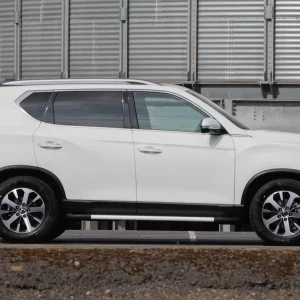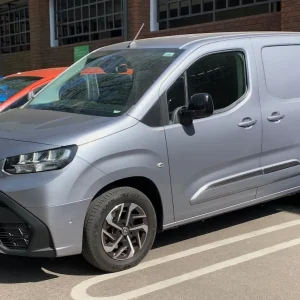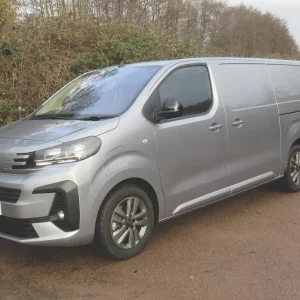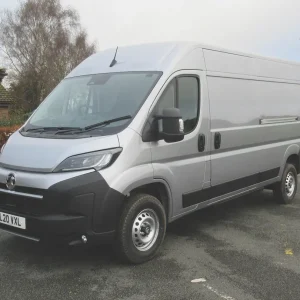The Transit Custom first gave Ford a prime contender against the dominance of the Volkswagen Transporter and Renault Trafic in the sub-3.5t class. The Custom we have here pushes right up to that boundary, with a gross vehicle mass of 3.4t.
Two wheelbase lengths are available for the Transit Custom – 2.93m and 3.30m – giving overall lengths of 4.97m and 5.34m, respectively, and equating to load bay lengths of 2.55m and 2.91m.
Internal heights are 1.45m and 1.77m with load bay widths of 1.77m overall and 1.35m between the wheel arches, making load volumes of 6.0–8.3m3 with maximum payload at 1,406kg.
Twin rear doors open 1.4m wide, but only to 180º. The left-side loading door is 1.03m wide. Both get decent access steps, while the load bay has eight lashing eyes, GRP floor protection, ply-lined sides, four (very bright) interior lights and a full height cab bulkhead. You can set up single point unlocking and drive-away auto locking too.
The cab is excellent, with interior space and storage to rival any larger 3.5t LCV.
As well as cup holders at the fascia ends and flip-down in the centre, there are numerous pockets in the doors, facia top and an overhead ‘DIN’ slot suitable for a tachograph.
The three-seat layout is actually usable, with enough knee room for the middle occupant and a fold-down mini ‘desk’ when unoccupied.
Bottle holders, 12v and USB sockets and a multi-adjustable driver’s seat cover all possibilities. The four element mirrors are excellent and the button-laden adjustable steering wheel is ergonomically sound but small, being from a Fiesta, and feels a little incongruous.
All the major switchgear is grouped around the driver – where in certain German rivals it remains set for LHD – and the touchscreen for audio, navigation and phone is logical and simple. This is, quite simply, one of the best driver-focused vans on the market.
This is the mild hybrid electric vehicle (MHEV) version of the Custom, with a 130hp (as tested) or 170hp 2.0-litre diesel and 48v system where the starter motor and generator are combined.
Easy to add to virtually any petrol or diesel vehicle, it offers a tangible – if moderate – improvement in economy and drivability. It’s the latter-day equivalent of changing from carburettors to fuel injection and will surely be the last major development of the piston engine before we are forced down the cul de sac of battery-electric traction.
In practice it increases the engine braking downhill as the load on the generator replenishes the battery, and then it uses that to give a motorised boost to hill climbing or acceleration.
It’s a high-tech version of an old geezer on a moped in the 1970s and it provides fuel economy not far off.
Over a 450-mile mix of A-roads and motorway we saw a best of 44mpg and harder-won city and rural miles came in at 39 miles to every gallon.
The torque curve is flat from 1,500–2,000rpm, equal to 56–74mph on the Custom’s 37mph/1000rpm sixth gear. The close ratios at the bottom end provide vivid acceleration, but eco mode dulls the accelerator. A good driver will achieve the same miles per gallon in normal mode, without the loss of urge needed to overtake.
The ride/handling compromise is well judged, steering feel is excellent and the turning circle is impressive for this wheelbase, while its length offers benefits in ride comfort.
With excellent payload and volume, cab comfort, stacks of kit and good economy, this is an impressive package and certainly worthy of the Transit name and heritage.
Ford Transit Custom 2.0TDCi MHEV Limited LWB Low Roof Panel Van 130bhp
Price (ex VAT) £32,717
Price range (inc VAT) £23,090-£34,375
Insurance group 39A
Warranty 3yrs/100,000mls
Service intervals 2yrs/25,000 mls
Load length 2,921mm
Load width (min/max) 1,351mm /1,775mm
Load bay height 1,406mm
Gross payload 1,406kg
Load volume 6.8m3
Engine size/power 1,999cc/130bhp
Combined fuel economy 40.9mpg
CO2 203g/km





